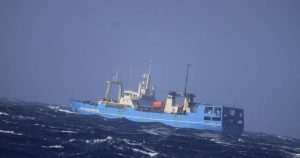The Government of Madeira (PSD/CDS-PP), which delivered today the programme for the 2023-2027 quadrennium, intends to create its own legal regime for the production of renewable electricity in the autonomous region.
This is one of several measures that the Madeiran executive, led by the social democrat Miguel Albuquerque, has integrated into the XIV Regional Government Programme, delivered this morning to the President of the Legislative Assembly of Madeira, José Manuel Rodrigues (CDS-PP).
The document, consisting of 190 pages, is divided into nine chapters: Autonomy and Reform of the Political System; Education and Training, Migration, Sports, Science, and Technology; Economy, Sea, and Fisheries; Finance, Fiscal Autonomy, and International Competitiveness; Health and Civil Protection; Tourism and Culture; Agriculture and Environment; Equipment and Infrastructures; Inclusion and Youth.
In the chapter dedicated to equipment and infrastructure, the Madeiran Government has integrated a set of measures in the area of energy, which aim to meet the objectives of reducing greenhouse gases by 2030 and achieving carbon neutrality by 2050.
In addition to the creation of a specific legal regime for the production of renewable electricity in Madeira, Miguel Albuquerque’s executive underlines the need to “digitise the electricity grid, invest in energy efficiency in all sectors of activity” and “create the most attractive conditions necessary for investment in the production of renewable electricity.”
It is also necessary to diversify energy sources, increase the capacity of energy storage infrastructures, as well as “increase the contribution of the various economic agents (companies and households) in the production of energy through renewable resources for self-consumption.”
According to the Government Programme, as a way to combat energy poverty, the executive also intends to create a programme to support the acquisition of energy production systems from renewable sources for needy families who benefit from the social tariff for electricity and a scheme to support the acquisition of more efficient electrical systems and equipment, replacing gas, in order to enhance the use of the social electricity tariff.
Also in the same chapter, the Regional Government classifies the issue of housing as “one of the fundamental axes of public policy” of the present executive, committing to increase investment in the public housing stock through the construction, rehabilitation and acquisition of more housing for social purposes.
Strengthening support for the purchase of own housing by middle-class families, namely young households that do not have the financial capacity to buy a house at market prices, is another of the measures proposed in the document.
In the area of tourism, the Madeiran Government wants to “ensure the cultural, economic, environmental and social sustainability of the destination through the continuity of the certification process of the Autonomous Region of Madeira as a ‘Sustainable Tourist Destination,’ as well as to create a tax on tourist activity.
In agriculture, on the other hand, it is intended to “prioritise technical support to the farmer in the face of new climate scenarios, namely for a more effective control of pests and diseases that affect crops, associating scientific knowledge and technologies with a quantitative and qualitative improvement of production and satisfaction of markets, associated with food security.”
Samantha Gannon
info at madeira-weekly.com





